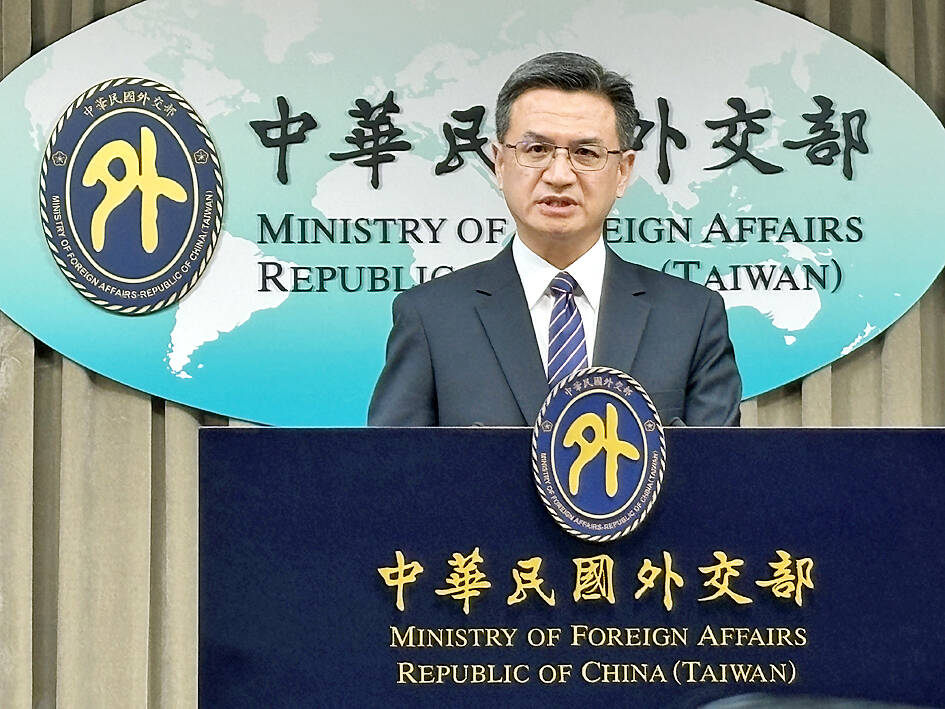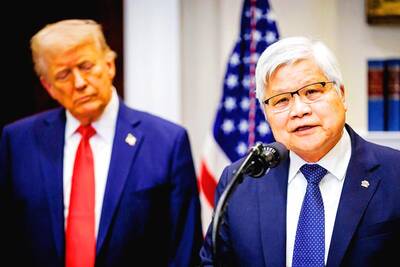The Republic of China (ROC) is a sovereign state that is not subordinate to the People’s Republic of China (PRC) and Taiwan has never been ruled by the PRC, the Ministry of Foreign Affairs (MOFA) yesterday stated in response to PRC President Xi Jinping’s (習近平) claim that “Taiwan is a sacred territory of China.”
Xi on Monday evening, the eve of the 75th anniversary of the PRC, made the claim in a speech delivered at a National Day reception banquet in Beijing.
He reiterated Beijing’s goal of achieving “reunification” with Taiwan, saying that it is inevitable and crucial for “fulfilling the great rejuvenation of the Chinese nation,” which is “the hope of Hong Kong, Macau, Taiwan and all Chinese people.”

Photo: Taipei Times
“It is an irreversible trend, a matter of righteousness, and the common aspiration of the people,” Xi said. “No one can stop the march of history.”
“Taiwan is the sacred territory of China. Blood is thicker than water, and people on both sides of the Taiwan Strait are connected by blood, and these blood ties will always be stronger than others,” he said.
Xi also called for deepening economic and cultural exchanges with Taiwan and encouraging the “spiritual harmony of compatriots on both sides,” while resolutely opposing “Taiwan independence” activities.
In Taipei yesterday, MOFA spokesman Jeff Liu (劉永健) said the ministry’s stance is clear: “ROC Taiwan is a sovereign state, and it and the PRC are not subordinate to each other.”
“Taiwan has never been a part of the PRC, and the PRC has never ruled Taiwan, which is a fact and status quo generally acknowledged by the international community,” he said in response to media queries.
Regarding Xi’s remarks on promoting the “spiritual harmony of people on both sides of the Strait” and “placing the hope on Taiwanese,” Liu said that Taiwan’s more than 23 million people stand firm with the nation’s democratic constitutional system, and firmly believe that the ROC and the PRC are not subordinate to each other.
They also believe that the nation’s sovereignty is inviolable and unannexable, and that the ROC’s future must be determined by the will of the Taiwanese, he said.
“We call for peace and stability in the Taiwan Strait, and request the international space we deserve and the legitimate right to participate in international organizations,” Liu said.
“We also hope that we will not experience interference when we cheer for Taiwan’s athletes in the Olympics,” he added.
Separately, the Mainland Affairs Council (MAC) yesterday also stated that the ROC is a sovereign state and that Taiwan has never been a part of the PRC.
That is the objective reality and the “status quo” of the Taiwan Strait, the council added.
The CCP uses its so-called “one China principle” and “1992 consensus” as the political precondition for cross-strait interaction, but it does not leave any “survival space” for the ROC, so it has been rejected by the mainstream public opinion in Taiwan, the council said.
The “1992 consensus” refers to a tacit understanding between the then-ruling Chinese Nationalist Party (KMT) and the CCP that both sides of the Strait are part of “one China,” but with each side having its own interpretation of what “China” means.
Additional reporting by Chen Fu-yu

ENDEAVOR MANTA: The ship is programmed to automatically return to its designated home port and would self-destruct if seized by another party The Endeavor Manta, Taiwan’s first military-specification uncrewed surface vehicle (USV) tailor-made to operate in the Taiwan Strait in a bid to bolster the nation’s asymmetric combat capabilities made its first appearance at Kaohsiung’s Singda Harbor yesterday. Taking inspiration from Ukraine’s navy, which is using USVs to force Russia’s Black Sea fleet to take shelter within its own ports, CSBC Taiwan (台灣國際造船) established a research and development unit on USVs last year, CSBC chairman Huang Cheng-hung (黃正弘) said. With the exception of the satellite guidance system and the outboard motors — which were purchased from foreign companies that were not affiliated with Chinese-funded

PERMIT REVOKED: The influencer at a news conference said the National Immigration Agency was infringing on human rights and persecuting Chinese spouses Chinese influencer “Yaya in Taiwan” (亞亞在台灣) yesterday evening voluntarily left Taiwan, despite saying yesterday morning that she had “no intention” of leaving after her residence permit was revoked over her comments on Taiwan being “unified” with China by military force. The Ministry of the Interior yesterday had said that it could forcibly deport the influencer at midnight, but was considering taking a more flexible approach and beginning procedures this morning. The influencer, whose given name is Liu Zhenya (劉振亞), departed on a 8:45pm flight from Taipei International Airport (Songshan airport) to Fuzhou, China. Liu held a news conference at the airport at 7pm,

KAOHSIUNG CEREMONY: The contract chipmaker is planning to build 5 fabs in the southern city to gradually expand its 2-nanometer chip capacity Taiwan Semiconductor Manufacturing Co (TSMC, 台積電), the world’s biggest contract chipmaker, yesterday confirmed that it plans to hold a ceremony on March 31 to unveil a capacity expansion plan for its most advanced 2-nanometer chips in Kaohsiung, demonstrating its commitment to further investment at home. The ceremony is to be hosted by TSMC cochief operating officer Y.P. Chyn (秦永沛). It did not disclose whether Premier Cho Jung-tai (卓榮泰) and high-ranking government officials would attend the ceremony. More details are to be released next week, it said. The chipmaker’s latest move came after its announcement earlier this month of an additional US$100 billion

Authorities yesterday elaborated on the rules governing Employment Gold Cards after a US cardholder was barred from entering Taiwan for six years after working without a permit during a 2023 visit. American YouTuber LeLe Farley was barred after already being approved for an Employment Gold Card, he said in a video published on his channel on Saturday. Farley, who has more than 420,000 subscribers on his YouTube channel, was approved for his Gold Card last month, but was told at a check-in counter at the Los Angeles International Airport that he could not enter Taiwan. That was because he previously participated in two